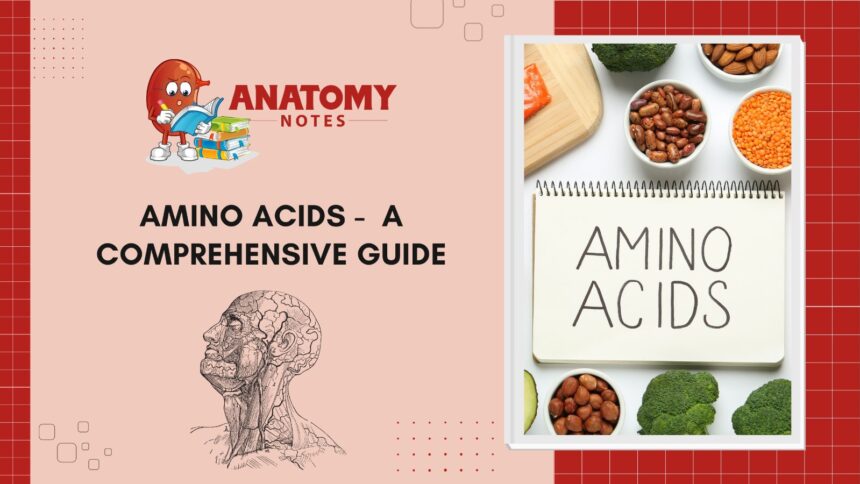Introduction to Amino Acids
Welcome to the fascinating world of amino acids – the building blocks of life! Whether you’re a health enthusiast, fitness junkie, or simply curious about how your body works, understanding amino acids is essential. From protein synthesis to brain function, these tiny molecules play a big role in keeping us healthy and thriving. So grab a seat and get ready to dive into everything you need to know about amino acids!
The Structure of Amino Acids
Amino acids are the building blocks of proteins, each with a unique structure that plays a crucial role in various bodily functions. Structurally, amino acids consist of an amine group (NH2), a carboxyl group (COOH), and a side chain (R group) attached to a central carbon atom.
The side chain differs for each amino acid, giving them distinct properties and functions. This diversity in structure allows for the wide range of roles amino acids play in the body, from supporting muscle growth to aiding in neurotransmitter function.
There are 20 standard amino acids that humans use to build proteins, each contributing to the overall health and vitality of our bodies. Understanding their structures provides insight into how they interact within biological systems and contribute to overall well-being.
Incorporating a variety of foods rich in different amino acids is essential for maintaining optimal health and ensuring proper protein synthesis throughout the body.
Essential vs. Non-Essential Amino Acids
When it comes to amino acids, there are two main categories: essential and non-essential. Essential amino acids are the ones our bodies can’t produce on their own, so we need to get them from food sources. Non-essential amino acids, on the other hand, are produced by the body itself.
Essential amino acids play a crucial role in various bodily functions like building proteins and supporting overall health. Without an adequate intake of these essential amino acids, our bodies may not function optimally.
Non-essential amino acids are still important as they support processes like tissue repair and nutrient absorption. Even though they can be synthesized by the body, getting them from dietary sources is beneficial for overall health.
Both types of amino acids work together harmoniously to keep our bodies functioning properly and maintaining good health. Remember to include a variety of protein-rich foods in your diet to ensure you’re getting all the essential and non-essential amino acids your body needs!
Functions of Amino Acids in the Body
Amino acids play vital roles in the body beyond just muscle building. They are the building blocks of protein, essential for various bodily functions. These tiny molecules are involved in hormone production, enzyme activity, and even immune function.
Certain amino acids act as precursors to neurotransmitters like serotonin and dopamine, influencing mood and cognitive function. Others help transport nutrients throughout the body or support tissue repair processes after injury or exercise.
Additionally, some amino acids have antioxidant properties that protect cells from damage caused by free radicals. They also contribute to energy production and metabolic processes within cells.
In essence, amino acids are not only crucial for maintaining muscle mass but also for supporting overall health and wellbeing. So next time you think about them, remember their diverse roles in keeping your body functioning optimally.
Protein Synthesis and Amino Acids
Protein synthesis is a complex process essential for building and repairing tissues in the body. Amino acids play a crucial role in this intricate mechanism by serving as the building blocks of proteins. Without an adequate supply of amino acids, protein synthesis cannot occur efficiently.
When you consume protein-rich foods, your body breaks down the protein into individual amino acids during digestion. These amino acids are then utilized by cells to create new proteins necessary for various bodily functions. Each type of protein synthesized requires a specific sequence of amino acids to be linked together in precise order.
Furthermore, certain amino acids act as signaling molecules that regulate the rate of protein synthesis in response to factors like exercise or stress. This dynamic process ensures that your body can adapt and repair itself accordingly. In essence, understanding the relationship between protein synthesis and amino acids highlights the importance of incorporating quality sources of protein in your diet for optimal health and function.
Sources of Amino Acids in the Diet
When it comes to getting amino acids in your diet, there are plenty of sources to choose from. Animal-based foods like meat, fish, eggs, and dairy products are rich in complete proteins that provide all the essential amino acids your body needs. Plant-based sources such as beans, lentils, nuts, seeds, and whole grains also contain amino acids but may be lacking in one or more essential types.
For those following a vegetarian or vegan diet, combining different plant-based protein sources throughout the day can ensure you’re getting a good balance of amino acids. Additionally, soy products like tofu and tempeh are excellent plant-based sources of complete proteins.
Supplements like protein powders or BCAAs can also be used to boost your intake of specific amino acids if needed. Maintaining a varied diet with a mix of animal and plant-based protein sources is key to meeting your body’s amino acid requirements.
Amino Acid Deficiencies and Health Implications
Amino acid deficiencies can have significant health implications that may affect various bodily functions. When the body lacks essential amino acids, it can lead to issues like muscle wasting, fatigue, and compromised immune function. These vital building blocks of proteins play a crucial role in maintaining overall health.
Inadequate intake or absorption of amino acids from the diet can result in nutritional deficiencies that impact metabolism and energy production. This deficiency can also hinder the body’s ability to repair tissues and synthesize important molecules for optimal functioning.
Certain medical conditions or dietary restrictions may contribute to amino acid deficiencies, highlighting the importance of consuming a balanced diet rich in protein sources. Consulting with a healthcare provider or nutritionist can help identify potential deficiencies and develop strategies to address them effectively.
Addressing amino acid deficiencies promptly is key to supporting optimal health and well-being. By understanding the role of these compounds in the body, individuals can take proactive steps towards maintaining proper nutrient balance for overall vitality.
Branched-Chain Amino Acids (BCAAs): What You Need to Know
Branched-Chain Amino Acids (BCAAs) are a group of essential amino acids that play a crucial role in muscle growth and recovery. Leucine, isoleucine, and valine make up the BCAA family, known for their unique branched structure. These amino acids cannot be produced by the body and must be obtained through diet or supplementation.
BCAAs are popular among athletes and fitness enthusiasts due to their ability to promote protein synthesis, reduce muscle breakdown during exercise, and improve endurance. They can also help alleviate muscle soreness post-workout.
Including BCAAs in your nutrition plan can support your fitness goals and overall performance. Whether you’re an avid gym-goer or someone looking to enhance their physical endurance, incorporating BCAAs into your routine can make a noticeable difference.
Remember to consult with a healthcare professional before adding any new supplements to your regimen. By understanding the benefits of BCAAs, you can optimize your workout results and support your body’s recovery process effectively.
Amino Acids in Sports Nutrition and Muscle Building
Amino acids play a crucial role in sports nutrition and muscle building. When it comes to maximizing performance and recovery, these building blocks of protein are essential.
During intense workouts, muscles undergo stress and damage, requiring sufficient amino acids for repair and growth. This is where supplementing with specific amino acids like BCAAs can be beneficial in promoting muscle protein synthesis.
BCAAs, including leucine, isoleucine, and valine, are known for their ability to support muscle recovery post-exercise. They can also help reduce fatigue during prolonged physical activity by serving as an energy source for muscles.
Incorporating adequate amounts of amino acids through diet or supplementation can aid athletes in achieving their fitness goals more effectively. Whether you’re a professional athlete or a weekend warrior, optimizing your amino acid intake can make a significant difference in your performance and overall results.
The Role of Amino Acids in Metabolism
Amino acids play a crucial role in metabolism, the process by which our bodies convert food into energy. They are the building blocks of proteins, which are essential for various metabolic functions. Without an adequate supply of amino acids, our metabolism can be negatively impacted.
Certain amino acids, like glutamine and arginine, help regulate key metabolic pathways that control how nutrients are utilized and energy is produced in the body. These amino acids also assist in maintaining healthy organs and tissues necessary for optimal metabolic function.
Moreover, some amino acids act as precursors to important molecules involved in metabolism, such as acetyl-CoA and nitric oxide. This further highlights their critical role in supporting overall metabolic processes within the body.
In essence, understanding the contribution of amino acids to metabolism sheds light on how these tiny molecules have a profound impact on our overall health and well-being.
Amino Acids and Neurotransmitters: Their Impact on Brain Function
Amino acids play a crucial role in brain function, influencing neurotransmitters that regulate mood, cognition, and overall mental health. These chemical messengers rely on amino acids to transmit signals between neurons, impacting everything from memory and focus to emotions and sleep patterns.
Glutamine is an amino acid known for its role in promoting mental clarity and concentration by supporting the production of GABA, a calming neurotransmitter. On the other hand, tyrosine is essential for synthesizing dopamine and norepinephrine, which are involved in motivation, pleasure, and stress response.
Tryptophan is another key player as it serves as a precursor to serotonin – the feel-good neurotransmitter responsible for regulating mood and promoting feelings of well-being. Insufficient levels of these amino acids can lead to imbalances in neurotransmitters, potentially contributing to conditions like anxiety, depression, or cognitive decline.
By understanding how amino acids impact brain function through neurotransmitter modulation, researchers have been able to develop targeted nutritional therapies for specific mental health concerns. For example, supplementation with tryptophan or 5-HTP (a precursor to serotonin) has been shown to improve symptoms of depression and anxiety.
Additionally, amino acid-based supplements have been found to be effective in improving cognitive function and reducing stress. For instance, a combination of tyrosine and cysteine has been shown to improve working memory and attention in healthy adults.
In summary, amino acids are essential for maintaining optimal brain function by influencing the production of neurotransmitters that regulate mood, cognition, and other mental processes. Incorporating adequate amounts of these building blocks into your diet can help support a healthy mind and body.
Common Misconceptions about Amino Acids
Common misconceptions about amino acids often revolve around the idea that they are only important for bodybuilders or athletes. In reality, amino acids play crucial roles in various bodily functions beyond just muscle building. Another common misconception is that all amino acids can be produced by the body, neglecting the importance of essential amino acids obtained from diet.
Some may believe that consuming high amounts of protein automatically guarantees sufficient intake of all necessary amino acids. However, it’s crucial to ensure a balanced and varied diet to obtain all essential amino acids. Additionally, there’s a misconception that taking large doses of amino acid supplements will always lead to better health outcomes.
It’s important to remember that moderation and balance are key when it comes to supplementing with amino acids. Some people might think that as long as they eat enough protein-rich foods, they don’t need to worry about specific types or ratios of amino acids. Understanding the different roles each amino acid plays can help optimize overall health and well-being.
Conclusion
As we come to the end of this journey exploring the fascinating world of amino acids, it’s clear that these building blocks of protein play a crucial role in our overall health and well-being. From essential to non-essential amino acids, each one has its unique function in the body.
Whether you’re looking to improve muscle growth, support brain function, or enhance your metabolism, understanding how amino acids work is key. Remember, a balanced diet rich in sources of amino acids is fundamental for optimal health.
Branched-chain amino acids (BCAAs) are gaining popularity in sports nutrition for their potential benefits in muscle recovery and performance. It’s important to consult with a healthcare professional before incorporating them into your routine.
The impact of amino acids on our bodies goes far beyond just muscle building. They are involved in numerous physiological processes that keep us healthy and thriving every day. Keep exploring and learning about this complex yet vital part of nutrition!
Frequently Asked Questions (FAQs)
Q1. Can I get enough amino acids from my diet alone?
Yes, you can obtain essential amino acids from a well-balanced diet that includes sources of complete proteins like meat, fish, eggs, and dairy products. However, some individuals may benefit from amino acid supplements.
Q2. Are there any risks associated with consuming amino acid supplements?
While most people can safely consume amino acid supplements in moderation, it’s important to consult with a healthcare provider before adding them to your routine. Excessive intake of certain amino acids may have adverse effects on health.
Q3. How do I know if I have an amino acid deficiency?
Symptoms of an amino acid deficiency can vary depending on the specific type of deficiency. If you suspect you may be deficient in certain amino acids, speak to a healthcare professional for proper evaluation and guidance.
Q4. Are there any interactions between medications and amino acid supplements?
Some medications may interact with certain types of amino acid supplements. It’s crucial to inform your healthcare provider about all the supplements you are taking to prevent potential interactions and side effects.
Remember that while incorporating adequate amounts of amino acids into your diet is essential for overall health and well-being, balance is key. By understanding the role these building blocks play in various bodily functions, you can make informed choices to support optimal health and performance.




